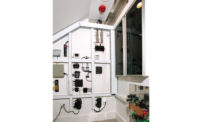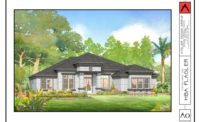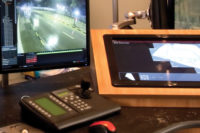
Nova Scotia-based integrator DNS Systems installs home security and control systems in single-family and town homes for builders in the area.
As recently as a few years ago, Nova Scotia-based integrator DNS Systems found itself struggling to convince homebuilders that control technology could help differentiate their homes from their competition.
Many builders believed it would be costly and unnecessary to incorporate the technology – and homebuyers were not asking for it, anyway, they thought. But DNS Systems is finding that builders are more willing to listen these days. The same can be said for regions where the housing markets are not very strong.
“Because of increased competition in the building market, we’ve found that builders here are more willing to try differentiating their homes with new technology,” reports Paul Ingram, DNS Systems president. “Builders quickly realize home technology is an effective way to help sell houses.”
Seeing that many people are plugged into the Internet every day, DNS Systems is helping builders sell the concept of keeping an eye on the house – from hundreds of miles away.
“Homeowners depend on the builder to construct a home that can facilitate current and future technology standards,” Ingram points out. “They see builders as experts in what needs to be in the home, and not all builders realized this.”
DNS Systems began educating builders on technology and consumer trends. To settle cost concerns, DNS Systems also created an affordable technology solution with an architecture that could be expanded easily to the fit the needs of the homeowner.
Builders were then able to realize how the dominating presence of gadgets such as PDAs, cell phones, PCs and other electronics has helped make today’s consumers more tech-savvy. They learned that as a result of this trend, more homeowners are looking for similar technological advancements in the household.
“We learned that home buyers are interested in more than just home theaters, but also technologies that can help manage the household,” notes Alan Roach, senior supervisor at Austin Contracting in Nova Scotia.
Austin Contracting recently partnered with DNS Systems to outfit 192 new town homes in Dartmouth with such technology. Each town home in the development includes technology that can be equipped to allow owners to control and monitor home functions such as security, lighting and heating, ventilation and air conditioning (HVAC) from afar. Austin Contracting’s goal is to standardize every home it builds with technology that can help enhance the absent homeowner’s lifestyle.
“We were able to see end users interact with home management systems and saw first-hand how excited they were about the capabilities,” Roach relates. “Immediately, we knew this technology would help us sell houses.”
In the Dartmouth town home development, each town home is outfitted with a structured wiring solution from Honeywell, which serves as the backbone of the home management for future communications systems.
With that backbone, the builder can offer prospective home buyers a variety of remote management features, including remote access to security, HVAC, lighting and other home systems via Web-interfaced devices such as PCs, cell phones or PDAs.
“Most builders neglect to consider adding more technology like home management systems because they believe it will cost too much,” Ingram relates. “Builders need to change their mindset and realize that technology like this won’t cost too much, and has both security and energy saving benefits that appeals to the home buyer.”

Paul Ingram, president of Nova Scotia-based integrator DNS Systems, believes structured wiring systems like this help builders sell houses.
SAVES AND SECURES
Remote access to the home’s security system can help secure the property when the homeowner is hundreds of miles away. During the winter season, many homeowners leave their homes for warmer climates.Instead of leaving their homes to trusting neighbors, Integrity Homes – another Canada-based builder – figured these snowbirds can use Web-based technology to oversee their properties. To do this, the builder partnered with DNS Systems to build 46 homes designed for home buyers 50 years old and up.
Home management systems can offer benefits to more than just vacationing retirees. If the homeowner forgets to arm the security system after leaving for work, he or she can arm the system easily from their work computer.
The security system can be disarmed just before children return home and homeowners can be notified via text message or e-mails when the alarm has been turned on, off or triggered.
Web access also offers the increasingly popular “green” benefits and can help save energy dollars. Remote management can help lower energy costs by limiting HVAC activity and turning off lights during the day if nobody is home.
Furthermore, home management technology such as the Honeywell Internet control module (ICM) can help save energy costs by allowing thermostats to communicate with the home’s security system.
Typical programmable thermostats do not have the capability to know when the home is empty or occupied. Through Honeywell’s ICM, thermostats can be programmed to raise or lower temperatures when the home’s security system is armed or disarmed.
Systems that use a single control panel to connect lighting, HVAC and security systems can compromise dependability in the system, Ingram maintains.
“The problem with using one control panel is if it malfunctions, or if one component goes down, then the whole system could freeze,” Ingram asserts.
To solve this, DNS Systems connected each home system with a designated Honeywell ICM. Using one Honeywell ICM unit for each home system helps safeguard against a total system failure. If lighting controls malfunction, security and HVAC controls still would operate reliably.
Some home management systems require an additional device such as a USB drive or CD-ROM to manage the security, lighting and HVAC systems. However, if these devices are lost, the homeowner is out of luck. The home system also can be vulnerable to hacking if someone else finds the device.
Because all programs for remote management are embedded in the Honeywell ICM units, DNS Systems eliminated the need for additional USB drives, CD-ROMs or other programmed devices.
Each unit routes to a Web address, where owners can access their home management systems without an extra device that could be lost during travel. DNS Systems established specific Web addresses, and log-ins with user names and passwords for each homeowner to use when accessing their systems.
“Austin Contracting and Integrity Homes have learned that these technologies can be leveraged to help sell their homes and stopped looking at it as added cost,” Ingram concludes.
In Integrity Homes’ case, partnering with integrators has helped overcome competition during the down housing market. The builder sold 35 of the 46 homes in the first three months of going to market.
Integrity Homes believes adding features that appeal to the tech-savvy consumer and addressing the green initiative can make all the difference when selling a home.
“Technology such as home management is going to be standard in every home in the future,” predicts Andrew Holley, Integrity Homes general manager. “We can see this trend fast approaching, and we want to be leaders in equipping homes with these capabilities.”
Sidebar: On The Job
From Honeywell (www.honeywell.com):Company designed “base” system
- Honeywell 18-inch QuickNetworks FutureSmart Cabinet
- MDX88300 for the termination of the telephone and cable television
- All telephones are terminated on 110 punchdown block of this panel allowing access of up to 4 separate telephone numbers utilizing the 4 twisted pairs of wires inside of the Cat5e cable. To accomplish this, the Honeywell FutureSmart LBO1 (Line Breakout Module) is used.
- Internal telephone and Internet jacks in the house are terminated on the Honeywell FutureSmart MDP3 patching module.
- Most television outlets in the house contain both cable TV “F” connector and an RJ45 network connection because of the increasing popularity of IPTV.
- Alarm systems use Honeywell Vista-15P control panel.
- VISTA ICM
- 6270 TouchCenter keypad
- 36-inch FutureSmart cabinet instead of the 18-inch
- Upgraded packages include MDC8T8RJ module for the telephones. This allows conversion of any telephone outlet in the house to a network connection and vice versa.
- The Honeywell MSMZ (MultiSource/MultiZone) A-BUS system
- The Honeywell A-BUS intercom
- CCTV (for viewing outside of the house from a television)


